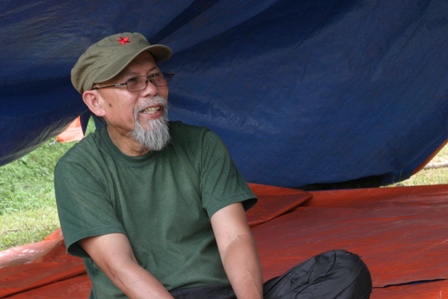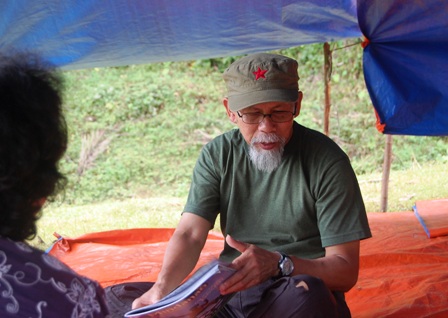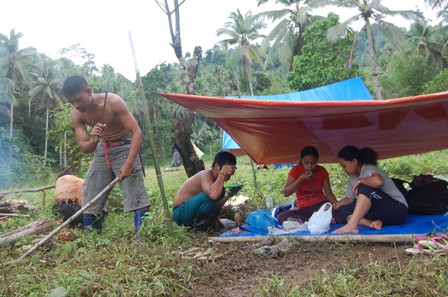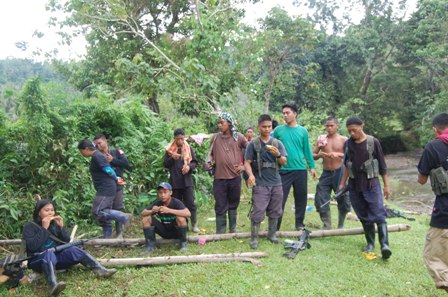SAN AGUSTIN, Surigao del Sur (MindaNews/02 January) – “We can stop them 0nly to a certain degree,” Jorge Madlos, spokesperson of the National Democratic Front (NDF) in Mindanao said of the mining firms operating in resource-rich Mindanao, seven of which reportedly threatened to pull out of the Caraga region due to revolutionary taxes imposed by the New Peoples’ Army.
Alex Padilla, the government’s chief negotiator in the peace talks with the NDF, last week said he will take this up with the NDF in their next meeting. Padilla and NDF peace panel chair Luis Jalandoni are set to meet again for informal talks this month in preparation for the formal talks in mid-February.
National newspapers quoted Padilla as saying that mining firms should not pay revolutionary taxes to the NPA. “Only the government can actually receive money from these companies for taxation purposes,” SunStar quoted Padilla as saying.
 Jorge Madlos aka Ka Oris, NDF Mindanao spokesperson during the December 29 interview. MindaNews photo by GG Bueno
Jorge Madlos aka Ka Oris, NDF Mindanao spokesperson during the December 29 interview. MindaNews photo by GG Bueno
In an interview in his makeshift tent at an NPA encampment here on December 29, Madlos told MindaNews they can stop the mining firms only “to a certain degree” because they have “legal papers from government agencies.”
“Actually, our policy is, if we can stop mining totally, we will just allow small-scale mining. If only we have that power to drive away those multinational mining companies…” he said, adding small-scale mining is “less destructive, employs more people, directly benefits the people.”
He said that in the bigger mining firms, the workers are fully paid but the mining methods are
“the most destructive” and the only ones who will benefit are the multinational firms.
“And yet as I said, they have the permits from the government, they are protected by law – this Mining Act which is not beneficial to the country, they are protected by the military, by the bureau of ….. We can only stop them to a certain degree but so far we have not succeeded in totally driving them away because for example, we burn five equipment, they still have more capital. What is five equipment, what is three or four damaged? Some damage may be overnight (but) they can repair, so I would say that the capacity of the movement is only to delay them up to …. Hasolon lang sila (Just harass them) so they better pay taxes.”
Madlos said some firms pay, some don’t “but most of them pay” amounts equivalent to “1% to 3% of their proceeds.”
He said the amount is small “compared to what mining firms “pay government plus their tips to the politicians and the military plus other agencies.”
“If you add them all, government official receipts plus politicians and other agencies, it’s not only 1 or 3%. That can even run to up to 40% so if you are paying this much, 40% to this person, here comes the NPA demanding 1 to 3%.”
Madlos said they compute the 1 to 3% “from their gross.We would know how many ‘goods’ they have sent to other countries so they better pay.”
He declined to say how much the firms pay or if they have, indeed, raised the amounts as alleged.
“Let them guess,” he said.
Collection of the “revolutionary taxes” is cash, Madlos said.
 NDF Mindanao spokesperson Jorge Madlos in San Agustin, Surigao del Sur, 29 December 2010. MindaNews photo by GG Bueno
NDF Mindanao spokesperson Jorge Madlos in San Agustin, Surigao del Sur, 29 December 2010. MindaNews photo by GG Bueno
“We tell them we can always delay you. With the smaller ones among the big ones, they better pay because otherwise they’ll incur more losses. The bigger ones, they see it is practical. After all, we are not demanding for us. The NPA does not pocket the amounts they (mining firms) give and they understand that. While those in the government and politicians who ask (the mining firms), they pocket the amount as their personal fund so they would rather pay taxes (to us).”
Asked how they deal with mining firms that are actually the subject of protests, Madlos replied: “All mining firms, especially the big mining firms, we say to them that we encourage people to protest against your mines and if we find out that they will not heed our policy, then we will impose sanctions against their company.”
“We tell them that you better listen on how workers have been treated. We inform them of the complaints of the Lumads about their 1% royalty share based on the IPRA (Indigenous Peoples Rights Act). We fight for the rights of the workers as part of our negotiations. One, pay your tax. Two, you fairly treat your workers. Three, pay what is due to the Lumad and to the communities in the vicinity.”
He cited as example what happened at the San Roque mining in Tubay, Agusan del Norte.
“They did not pay the Lumad the 1% (royalty share) so we attacked them,” he said.
The NPA on December 22, 2008 seized 21 firearms in two consecutive raids in Tubay. They engaged the police in a gunfight while simultaneously burning six multi-million worth of heavy equipment of the San Roque Metals Incorporated.
 NPA guerrillas break for a late lunch in Surigao del Sur December 29. MindaNews photo by GG Bueno
NPA guerrillas break for a late lunch in Surigao del Sur December 29. MindaNews photo by GG Bueno
Madlos shrugged off calls by Senator Gregorio Honasan for government to protect investors and mining companies facing rebel harassment by allowing them to form private armies to fight the insurgents “There is no going around it. We have to fight fire with fire, even the mayors in these areas dare not go into these places,” the Philippine Daily Inquirer quoted Honasan as saying.
“Well, we can’t do anything if they (mining firms) fight the NPA. If they say they will no longer continue their business because they’re bankrupt, they can (leave), okay with us (but) so long as they are in business… even if the company doesn’t recognize us a real government, they have to be practical. We are there. We don’t need to say that we are government. We don’t need to insist we are government. They will feel we are government. And they have a choice. We don’t say that because we’re government, you recognize us. Just give what is due to us as a government. That is our inherent right to tax the businessmen in our area and even if you don’t call us a government, as a revolutionary movement that is our inherent right,” he said.
Worldwide, the Philippines ranks third in gold, fourth in copper, fifth in nickel, and sixth in chromite. But the Philippine mining industry’s future is in resource-rich Mindanao. The island has 80% of the country’s deposits of copper, nickel and gold according to a policy paper prepared by the Mindanao Business Council for the 12th MinBizCon held in Cagayan de Oro City in October 2003.
 A day in the life of an NPA guerrilla. MindaNews photo by GG Bueno
A day in the life of an NPA guerrilla. MindaNews photo by GG Bueno
Under the Arroyo administration, 11 of the government’s 23 flagship mining projects were in Mindanao.
The Catholic Bishops Conference of the Philippines headed by Bishop Nereo Odchimar of Tandag, Surigao del Sur, wrote President Benigno Aquino on July 12, 2010, calling on the abroagation of the Mining Act of 1995 as it “does not adequately protect the interest of our people and the country’s natural resources.”
The bishops had earlier urged then President Arroyo to stop large-scale mining since it damages the delicate balance of the natural environment and affects the livelihood of small farmers, fisherfolk and the indigenous peoples.
In an interview before he became President, Aquino told MindaNews, “I’m not yet at the stage where I’m extremely competent or an expert on the subject (mining) but I do know already there are several problems that have to be addressed and all we have to do is to look at history and the experience of countries that had untrammeled mining operations ongoing and the long term consequences.”
In an ambush interview in Magsaysay, Occidental Mindoro on December 15, President Aquino was asked: Sir, ano po ang posisyon ninyo sa mining? (Sir, what’s your position on mining?)
The President’s reply as posted in the Official Gazette: “Sa bagay na iyon, mayroon tayong makukuhang trabaho diyan. Hinahabol natin na dagdagan ‘yung value added, iyong processing. Pero ang bottom line kung ano ang gusto ng mga mamamayan kung saan nandoon ‘yung mining concern. Kung ayaw ng taumbayan doon, sila ang papanigan natin” [We can generate jobs there. We hope we can have more value added (through) processing. But the bottomline is what the people want in the area where the mining concern is. If the people do not want (mining), we will support them]. (Carolyn O. Arguillas/MindaNews)
